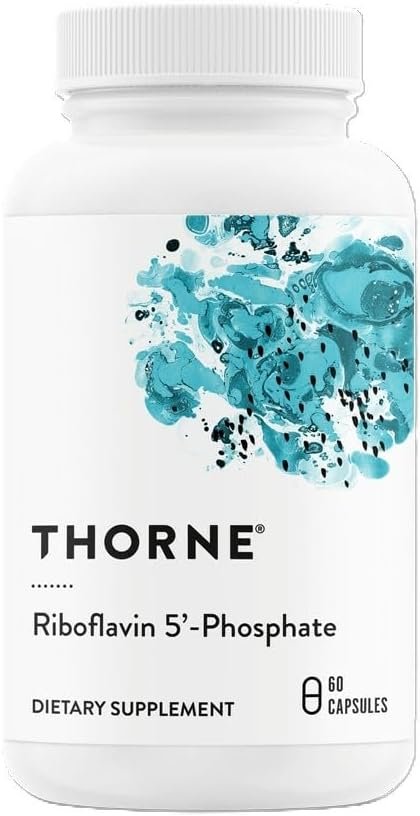Vitamin B2 (riboflavin) supplements are a water-soluble vitamin crucial for body growth and red blood cell production. It works synergistically with other B vitamins, making it essential for the release of energy from proteins, carbohydrates, and fats, and for normal cell growth and function.
Vitamin B2 plays a central role in energy metabolism. It is an essential component of two major coenzymes: flavin mononucleotide (FMN, also known as riboflavin-5′-phosphate) and flavin adenine dinucleotide (FAD). These coenzymes are crucial for the metabolic pathways that generate cellular energy and are involved in the metabolism of fats, drugs, and steroids.
In addition to its energy-producing role, riboflavin contributes significantly to the production of red blood cells, which is essential for the transport of oxygen throughout the body. It is also important for eye health; dietary riboflavin intake is associated with a lower risk of developing cataracts, and supplements combining riboflavin with niacin may be beneficial for their prevention.
Vitamin B2 supports the proper functioning of the nervous system and contributes to the reduction of tiredness and fatigue. It maintains the health of the skin, mucous membranes, and nails. An additional benefit is its role in maintaining normal blood homocysteine levels, an important factor for cardiovascular health. Finally, riboflavin is essential for the assimilation and activation of other B vitamins, including B3 (niacin), B6 (pyridoxine), and B9 (folic acid).
Recommended Riboflavin Supplements in the U.S. (Including Active Forms and Quality Certifications)
When selecting a riboflavin supplement, it’s important to consider the vitamin’s form and third-party quality certifications, which verify purity, potency, and good manufacturing practices.

Review of this product: This 400mg riboflavin supplement has proven highly effective in preventing migraines, according to multiple users who report dramatic reductions in the frequency and intensity of their episodes, going from 15 migraines per month to just one per week in some cases. The main advantage is the convenience of taking a single capsule daily instead of four 100mg pills, with a clean formula without unnecessary fillers and without an unpleasant taste or smell. Results are gradually observed over 2-4 months of consistent use, and it is recommended by neurologists as a natural alternative to preventative medications. The only side effect is bright yellow urine, which is completely normal and harmless. Excellent option for those looking to reduce their dependence on migraine medications, at a fair price considering the high dosage per capsule.

Review of this product: This Thorne Research supplement stands out for its exceptional quality and effectiveness, being recommended by doctors, nutritionists, and veterinary specialists as the gold standard for riboflavin 5′-phosphate. Users report diverse benefits, including elimination of nighttime leg cramps, improvement in migraines and chronic headaches, increased brain and physical energy, and effective support for methylation and detoxification issues. The capsules are small and easy to swallow, with reliable potency and purity that justify its higher price compared to other brands. It is especially valued by people with pernicious anemia who cannot tolerate multivitamins and by those following detox programs. Although it costs more than generic alternatives, the superior quality used in nutritional studies and the consistency of the product make it worth the investment for those seeking reliable results.
Why Consider B2 Supplementation? (Deficiency and Specific Conditions)
Severe riboflavin deficiency is rare in the United States, thanks to the abundance of this vitamin in fortified foods such as breads and cereals, as well as dairy products, meats, eggs, and vegetables. However, when it occurs, riboflavin deficiency can manifest through various symptoms, including anemia, mouth or lip ulcers (such as cheilosis or angular stomatitis), skin problems, sore throat, inflammation of the mucous membranes, a burning sensation in the eyes, increased sensitivity to light, reduced vision, loss of appetite, weakness, fatigue, and depression.
Certain factors may increase the risk of insufficient intake or reduced absorption of B2. These include the use of oral contraceptives, alcohol and tobacco consumption, and excessive sugar and coffee intake. Additionally, people with liver conditions such as hepatitis, cirrhosis, or biliary obstruction may have decreased riboflavin absorption. Riboflavin supplementation is considered effective or possibly effective for several specific conditions:
Deficiency Prevention and Treatment: Riboflavin intake is effective in increasing levels of this vitamin in adults and children with a deficiency.
Cataracts: People who consume more riboflavin in their diet appear to have a lower risk of developing cataracts. Furthermore, taking supplements containing riboflavin with niacin appears to help prevent them.
Hyperhomocysteinemia: Riboflavin, along with folic acid and pyridoxine, appears to lower high levels of homocysteine in the blood, a cardiovascular risk factor.
Migraine Headaches: Taking high doses of riboflavin (typically 400 mg per day) appears to reduce the number of migraine attacks and the pain during these attacks.
